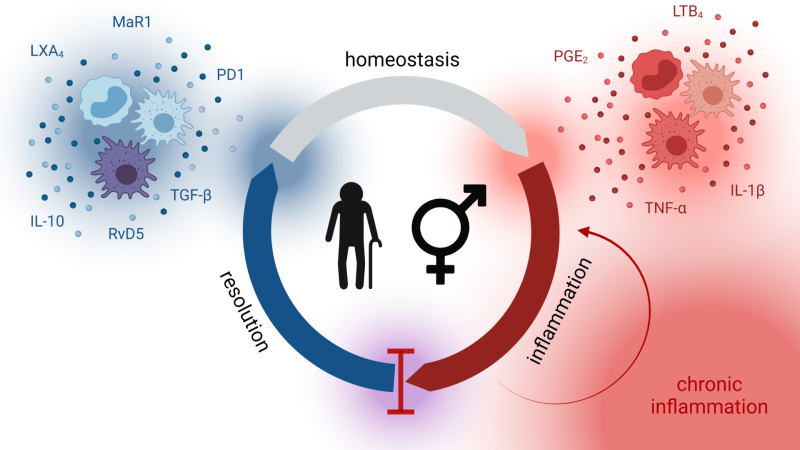Sex-specific inflammaging
The project ‘sex-specific inflammaging’ aims to elucidate how both inflammation and resolution are influenced by age and sex through means of metabolipidomics and cytokine profiling. Created with BioRender
Graphic: Patrick SchädelPrincipal Investigator: Oliver Werz
One hallmark of biological aging is the increased occurrence of a chronic, sterile and low-grade inflammation, commonly known as inflammaging, which is involved in the development of age-associated diseases like dementia, osteoporosis or cancer. Previous studies have shown, that inflammaging is often characterized by a shift in the biosynthesis of lipid mediators from specialized pro-resolving mediators (SPMs) towards pro-inflammatory prostaglandins and leukotrienes. Interestingly, the sex of the individual and the levels of sexual hormones have strong influences on the immunomodulatory mediators.
In this project we aim to use metabolipidomic profiling to establish biomarkers for both healthy aging and inflammaging. Center of our focus will be sex-specific differences in the inflammatory microenvironment guided by the release of lipid mediators from innate immune cells such as monocytes, macrophages and neutrophils. In this context we will elucidate the modulatory action of sexual hormones on the expression of lipoxygenases, cyclooxygenases and glutathione peroxidases and evaluate subsequent product formation. Further, we will measure immunomodulatory mediators (lipid mediators, cytokines, chemokines) released from tissue-resident macrophages in various organs of several model organisms (wildtype and humanized mice, wildtype and klara turquoise killifish, human samples). Additionally, we aim to modulate the metabolipidome through the application of natural products, nutritional supplements and vitamin E metabolites as tools to intervene in the process of inflammaging.
Doctoral researchers: Mareike Wichmann-Costaganna
Postdoctoral researcher: Patrick Schädel
